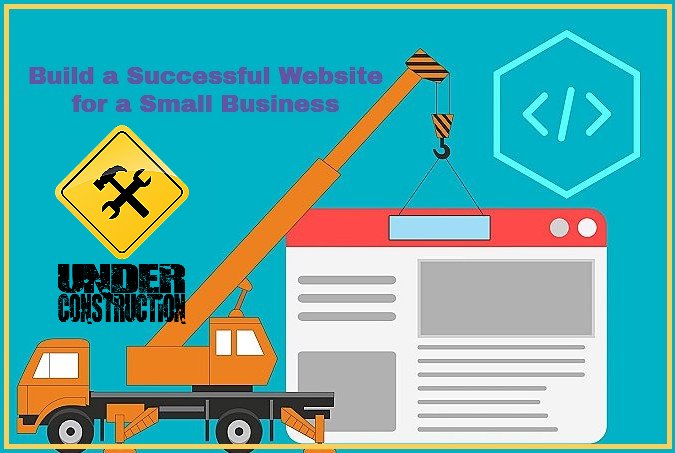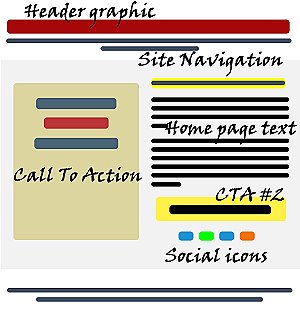by Kurt Scholle
How to Build a Business Website
 I’ve said for years that the 2 keys when you build a business website are to have a compelling offer and then drive traffic to it. And that is still a core strategy and focus.
I’ve said for years that the 2 keys when you build a business website are to have a compelling offer and then drive traffic to it. And that is still a core strategy and focus.
A couple of years ago when Google began focusing more on the performance of mobile devices as the percentage of web traffic from smartphones and tablets grew, I added that having a ‘mobile-friendly’ or ‘responsive’ site was also critical. Today, more than half the average amount of traffic coming to a website is from tablets and smartphones. If you have a local business; restaurant, practice, retail store or service provider, this becomes and even bigger big deal.
Then I started telling clients that having an overall understanding of who your prospects are is fundamental if you want to achieve website success. In fact, developing Target Personas may be the first or second key because everything else depends on finding and engaging people interested in buying your products or services.
The next key I added was having the right information to develop and monitor a successful website plan. Key Performance Indicators or Analytics help you find areas that need improvement, guide your strategy and measure your progress.
I’ve also come to learn that Mindset may be as important as any. If you don’t develop and execute a plan that achieves the keys above, you are going to fail at achieving Website Success or at least come short of your potential.
Benefits When You Build a Business Website
The benefits of a successful business website are more sales & profits, less stress, more productivity, better opportunities and more time to do what you want or need to do.
 I’m going to list those 7 keys in order of importance and then I will share with you 7 tips that will help you build a business website.
I’m going to list those 7 keys in order of importance and then I will share with you 7 tips that will help you build a business website.
- Develop a written Website Strategy Plan, based on your primary and secondary business goals, competitive analysis, market research and analysis of resources available. Secondary goals are important too. For instance, you may want to better support your product after the sale with videos or “how-to” content to avoid refunds. A secondary goal might also be to have your customers refer your product to others or share a testimonial.
- Define your Target Personas. You must know who you can market to, what they are saying they want, how they are saying it and where you might engage them. For more, click over to my blog post on “How to Create Target Personas” and how to determine the core desires of your Target Audience.Write down a description of your ideal client(s). Most people have more than one. You should also write down the types of clients to avoid, which may be just as important and save you lots of time and energy down the road..
- Creating content that converts. Includes text, images, videos, downloadables, audio and social media engagement, among others. MORE on Writing Content for a Website here.
- Getting visitors to your site and offers. Includes using content marketing to draw visitors organically or paid advertising like Facebook ads, links from other sites or directories or from your email list.
- Mobile. It’s easy with WordPress themes to create a site that is both attractive, without much design skills and mobile-ready. A good theme can be had for less that $100. Buy one.
- Set up Google Analytics and Google Search Console to see how your site is performing now and to measure the success of your efforts.
- Mindset. I’ve listed this last, but it’s as important as any tactics to achieve website success, especially for entrepreneurs who wear many hats and often put in many hours. Some of the ways to improve your mindset are to allow you to do the things that you know best and enjoy most. Having help with everything else, like planning and implementing or using checklists or getting guidance from others with experience make the job more enjoyable and profitable. Read Cindy Bidar’s guest post, “Are Limiting Beliefs About Money and Business Killing Your Dreams?“
One other thing about mindset. It is critically important to try and learn more each and every day. Top business people often spend 5 hours a week learning. It’s called The 5 Hour Rule. Your continuing education will help you with all of the above.
Build a Website For a Small Business Checklist
I wrote about the importance of having website checklists for new projects, daily or weekly activities or even the step-by-step instructions for frequent activities. They save time and help ensure the job is done right.
For more in-depth learning for website owners and managers, I recommend these 16 books for your consideration.
We will certainly talk more about these keys and more in upcoming articles, but I’d like to share something I wrote a while ago. 7 tips I think will help you have a better website. There is some overlap, which I think is OK.
I’d be interested in your questions and feedback once you have read it. Please share it too!
7 Tips to Achieving Website Success
1st tip…
Website Success comes primarily from one thing:
Your offer.
Assuming you attract the right audiences (more below) people will buy from you if they like the offer; if it salves their pain and if it is affordable – if they perceive an ROI.
Strong copy is important, but it will not beat a weak offer. Great design or user experience can help, but if won’t beat an inferior offer.
Most people fail at marketing due to presenting offers that don’t appeal to the target audiences.
I’m not saying you won’t make sales. You might.
But the ROI of your efforts, from building organic traffic to setting up ads on Facebook, Google, YouTube, LinkedIn, banners or even to your email list will never be acceptable and may end up costing you with the wrong ad.
Crafting a good offer requires research on your audience, competitors and marketplace. Find the solutions they seek – their ‘pain points.’ Learn how they describe their problem and solution and include it in your ad copy.
2: Understanding Your Audience is Critical
![]() Everything, including your offer, is based on your target audiences. They tell you what they want (which is often more important than what you think they need – even if you are correct).
Everything, including your offer, is based on your target audiences. They tell you what they want (which is often more important than what you think they need – even if you are correct).
They will tell you where they hang out so that you can follow, understand and engage them.
You will learn where to advertise to them and create more compelling ads.
Too many marketers and business owners have not defined their target audiences. These audiences, sometimes referred to as ‘client avatars,’ need to be documented. Market and competitive research should be a critical ongoing activity.
Even if you get your targeting right, you’re still missing your mark by a factor of 10. Only about 10% of your audience will buy. It’s important to find the 10% of your warm audience – the people who are aware of your brand or solutions.
When I worked for an NBC radio station in Chicago, we found that to improve our ratings and increase our advertising rates, it was easier to get the 20% of our cumulative audience who listened most to listen more, than to work on any of the other 4 segments of 20% of our audience. This is known as Quintile Analysis.
You might think that the 20% of our audience who listened more than the 3 least loyal quintiles and just less than the best segment would be prime for improvement.
Nope.
If we could get them to listen more, it came at the expense of our most loyal listeners.
This is where you start thinking of selling low-hanging fruit. What is easiest to sell to your primary base? Then build a business website that fully supports that goal.
We address the 80/20 rule below, we are applying it to where to focus your efforts. But it is may be a great idea of defining your target audiences by focusing on the top 20% (a quintile) than on the entire audience.
3: What are you selling exactly?
Some say, “People are buying ‘out’ of something, not ‘into’ something.”
Buyers do more to avoid pain than to gain pleasure.
Resonate with them by finding common ground and show them the solution.
Robert Cialdini, the author of “Pre-Suasion: A Revolutionary Way to Influence and Persuade” says, “We tend to think our message is what moves people, but it’s what we do first to create a particular state of mind in our audience that makes them receptive.”
Bond Halbert, son of legendary copywriter Gary Halbert suggests ways to use I and You statements. Always talk negatives about You and your experience. Example: If you say someone has a problem sleeping, they may say, “I don’t have a sleeping problem, I take Xanax and drink whiskey.” But if you talk about your problems sleeping, they may relate and find interest in your solution.
4: “People buy from you if they know, like and trust you.”
 I learned this from Sales Consultant Jeffrey Gitomer’s books and a seminar he did for a local Chamber of Commerce. I’m not sure he is the original source, because you see it everywhere, but I first learned it from him.
I learned this from Sales Consultant Jeffrey Gitomer’s books and a seminar he did for a local Chamber of Commerce. I’m not sure he is the original source, because you see it everywhere, but I first learned it from him.
Georgina El Morshdy wrote a great article on Copyblogger if you’re interested, “30 Ways to Build the Know, Like and Trust Factor that Grows an Audience.”
- 10 Ways to Get Known Online
- 10 Actions to Build Likeability Online
- 10 Factor That Build Trust With Your Audience
5: The 80/20 Rule.
80% of your efforts will yield 20% of your results
20% of your efforts will yield 80% of your results.
Most business owners spend their time on the 80% that only brings in 20% of the profits, rather than the other way around.
That leads to overwhelm. You’re busy, but you aren’t selling.
Do what’s important with 80% of your time. Spend the remaining 20% working on your website, tweaking your marketing or whatever.
During my radio career, I had some pretty good success programming radio stations. I was asked the secret to my success and I realized that I was just paying attention to five things. I may have even said, “I’m not smart enough to keep track of more than 5 things.”
I also said, “It’s amazing how many of the things below the top 5 on my list get taken care of or become irrelevant if you concentrate on the top 5.”
I’ve also learned that you stay more focused if you concentrate on ‘Important’ things rather than ‘Urgent’ things. When that concept was introduced to me a few years ago, it seemed counter-intuitive to me. Urgent, like a client’s website was down or an important deadline was coming due, always seemed to carry more weight.
Yes, they were important, but in the big picture they were not as important as the top 5.
 6: Keep Things Simple
6: Keep Things Simple
I’m told that most million dollar business owners have incredibly simple systems.
They work smart, not hard.
I think there are three benefits to this approach:
1) It reduces overwhelm.
2) Focusing on 5 things (or the 80%) that have the most impact move the needle more.
3) It makes it easier on your staff, partners or vendors to follow along and contribute more.
7: Know Your Numbers
Before we had computers that can track everything, our biggest and sometimes only Key Performance Indicator was how much business we had banked that day, week, month or year.
How many people brought in coupons you had printed in the local paper into your store or restaurant?
How many people entered your store that day? (Sometimes counted when your door was opened, or how many sales tickets were rung.)
Even today, salespeople on commission know how many sales they made, what their dollar-per-ticket is and who they might be working on to sell a computer system, car or home remodeling.
As the owner (or manager), do you know overall how those old-school KPIs stack up?
How does today compare to a year ago?
In high school, I worked for a garden center/gift shop and they tracked the weather, year over year, for insights.

Now with the Internet, you have even more information, including…
- Website visits.
- Pages viewed.
- What content did they resonate with?
- What content needs to revised for better interaction?
- How long they spend on the site or specific pages.
- What specific pages they looked at and for how long.
- What did they buy?
- Where did they come from?
- What keywords/keyphrases did they use to find you?
Do you have any questions about how to build a business website? Leave them in the comments below or find me on Twitter!





